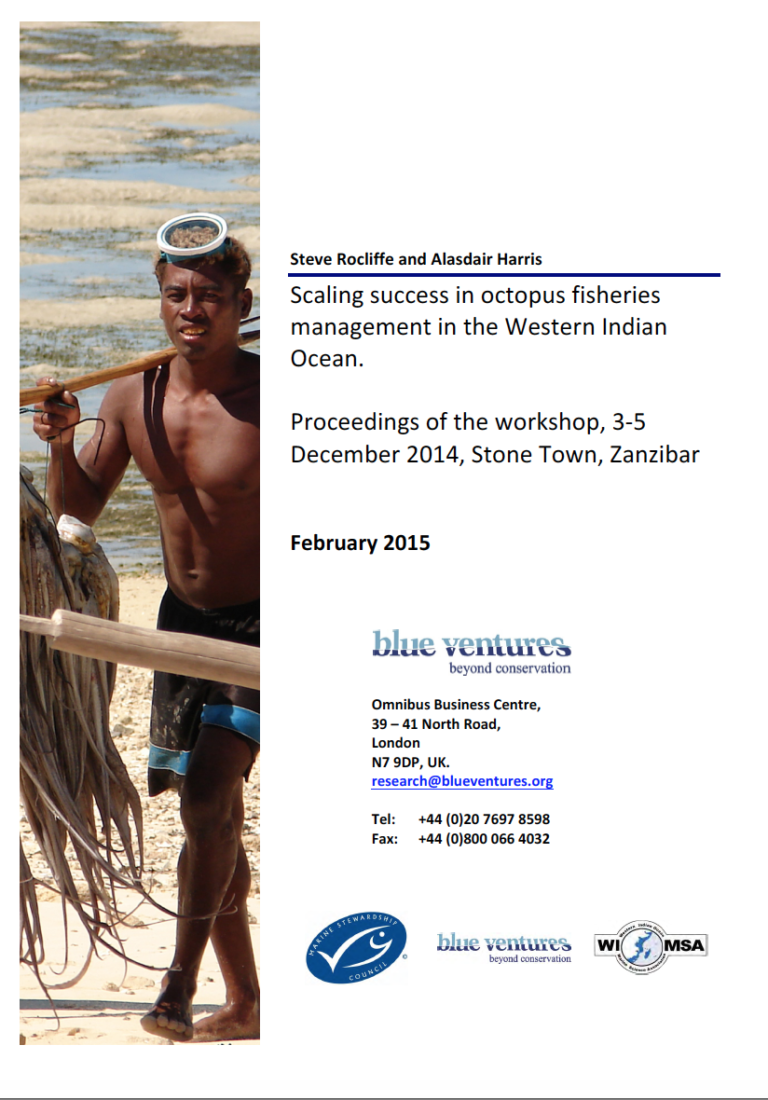Summary
The past decade has seen a proliferation of management efforts targeting small-scale fisheries in the Western Indian Ocean (WIO). Many measures have focused on building local capacity for management of reef octopus (Octopus cyanea ) and several fisheries have undergone pre-assessment against the Marine Stewardship Council’s (MSC) environmental standard. Recent years have seen a growing interest in fisheries improvement projects (FIPs) for invertebrate fisheries across the region, including some octopus fisheries moving towards MSC certification. As part of this effort, the Scaling success in octopus fisheries management in the Western Indian Ocean workshop was held from 03-05 December 2014 in Stone Town, Zanzibar. The meeting brought together 66 delegates representing governments, NGOs, fishing communities, regional organisations, academic institutions and the seafood industry to share experiences and lessons learned from efforts undertaken across the Western Indian Ocean to improve fisheries sustainability. The meeting was structured around five sessions over three days: i) Status and trends of WIO octopus fisheries and markets; ii) Local and national management approaches; iii) Overcoming data and capacity gaps for monitoring octopus fisheries; iv) Management challenges for attaining the MSC standard; and v) Towards certification – developing and implementing octopus fisheries improvement action plans.
Key Findings
• Improving the management of Africa’s small-scale fisheries can deliver sustained benefits throughout the seafood supply chain, benefiting coastal communities while rebuilding dwindling fish stocks and supporting parallel conservation efforts.
• Collaborative efforts between NGOs, governments, funding bodies and supply chain stakeholders have been very effective in delivering targeted outcomes in some FIPs.
• Successful FIP projects require partnerships with clear allocation of roles, sustained commitment from partners, and strong leadership.
• An increasing number of FIPs use MSC pre-assessment to guide the development of action plans.
• There is an urgent need to develop regional and national expertise within Africa and the Indian Ocean in fisheries stock assessment in order to reduce the costs of FIPs and the MSC certification process in the WIO.
• Approaches to small-scale fisheries management in the region are diverse but largely bottom-up. Given this, there is a need for greater support for local dialogue and community exchanges, and enhanced networking among small-scale fisheries management efforts around the region.
• Many small-scale fisheries management efforts are based on informal local governance systems that remain vulnerable to outside influences such as migrant and industrial fishers. Such efforts would benefit from increased support for decentralised, rights-based fisheries management from central fisheries authorities.
• African fisheries currently engaged in the FIPs process are early adopters. The world is watching and listening.












